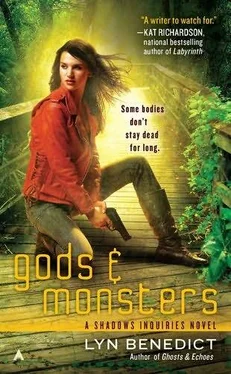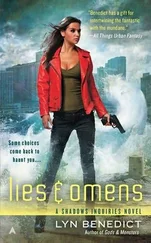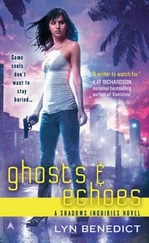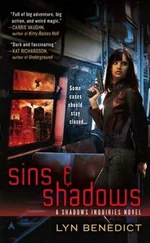The news bar across the bottom of the screen made her heart jolt: Three policemen killed in Everglades.
She hit the volume, listened to the newscast, trying to filter the controlled hysterics of the news anchor for actual fact—everything was urgent these days; everything was imminent doom on Channel 7. As far as she could tell, it was her crime scene, but what had changed? When she and Tatya had been there, it was as quiet as death; there hadn’t even been mosquito hum in the air. Now the newscasters mentioned bombs and ambushes in a single breath, followed it with a totally inane recap of how many helicopters were circling the scene, and a self-referential media report.
Sylvie muted the set, hit redial on her cell phone. “Lio. Give me a call if you’re all right—” Stupid message, but she felt the need to try something more than just waiting to see if the news anchors would broadcast the names of the dead.
Her office phone rang again, and Sylvie grabbed it, chanting Be Lio, be Lio in her head.
“Shadows Inquiries,” she said.
There was silence on the line, a silence of words, not breath. She heard a rasp of controlled air, a clogged sound that might be a stifled sob, and her hand tightened on the receiver. “It’s Sylvie. Who is this?”
“. . . Lio wants you,” the woman said, just when Sylvie was about to reluctantly let the line go dead again. “You come. You see him. Then you get away from my family.”
“Lourdes,” Sylvie said. Adelio Suarez’s wife. She skipped the questions rising to her lips— Was Lio all right? Was he hurt? What happened? —and homed in on the information she needed right at this moment. “Where are you?”
“Jackson Memorial,” Lourdes spat, and slammed the phone down.
* * *
SYLVIE LOOKED IN ON ADELIO AND WINCED EVEN AS RELIEF STARTED trickling into her system. He wasn’t in critical care, didn’t have anything her TV-trained eyes would assess as indicators of serious injury—no cannula, no morphine pump, no looming machinery surrounding the bed. But he didn’t look good, either. Both his eyes were so swollen that they made one bruised lump across the sharp bridge of his nose. A long row of stitches lined his jaw, and there was enough stitchwork, still shiny with recent cleaning, on his arms to make her think of quilt patches. The hospital room, clean as it was, smelled of smoke and blood.
Lourdes, seated beside Adelio on a visitor’s chair, rosary dangling from her fingers, looked up, and the expression on her face convinced Sylvie the woman would be adding Hail Marys for uncharitable thoughts to her postconfession routine next Thursday.
The woman got into Sylvie’s space, pushed her back into the hallway in silent, bulldog outrage. Sylvie, conscious of the damage she’d done this family, allowed herself to lose ground before a woman twice her age and half her size.
She throttled down the angry dark voice inside her that didn’t care for obedience or politeness or anything at all beyond its own survival, and let Lourdes tear her a new one, half in Spanish, half in English, all of it conducted with the careful, quiet fury of a woman who knew exactly how much noise would get unwelcome attention. Eventually, her words trailed off, fell apart under fear and hatred; her last sally was a broken, “You’re a bad person, Shadows. You killed my son, and now you try to kill Lio.”
“If I were such a bad person, would I sit here and listen to you?” Sylvie said. “Let me talk to Lio.”
“He’s sleeping.”
“He can wake up,” Sylvie said, and stepped forward decisively. Lourdes gave ground, then, in a sudden resurgence of fury, spat at Sylvie’s feet.
Sylvie studied the shining spot on the worn linoleum and thought it was lucky Lourdes Suarez was a good Catholic and not a bruja , or Sylvie would be fighting off a curse in the midst of Jackson Memorial’s inpatient wing. Instead, she just stepped around the sputum, marked it as a new low in her life, that a nice little Cuban housewife wanted to spit on her, and pushed her way back into Adelio’s room.
He can wake up, she had said, and it sounded easy then. Not so easy to lean over him, searching for an unscathed place to press gentle fingers. Even washed up, he stank of smoke. His hair was burned to stubble on one side. Not so easy to wake him from blissful unconsciousness into pain. But she needed to know.
She settled for tapping the pillow beside his face, a quick rat-a-tat of fingernails and pressure. He snorted awake, thrashed a bit, then stilled as events caught up with him. Through his puffed eye sockets, the narrow slit and shine of his eyes, she could see him remembering hospital . Remembering Sylvie .
He angled his head on the pillow, trying to get any view of her he could. “Not a bomb,” he said. “I didn’t get hit by shrapnel. The chart is wrong.”
“Okay,” she said. She sat down, hitched the visitor’s seat close, screek ing it over the linoleum. “What was it, then?”
“Bear.”
It was a meaningless syllable to her at first, glossolalia brought on by painkillers, then the word clicked. “You were attacked by a bear ? At a crime scene swarming with lights and cops?”
It just didn’t make sense. There were bears in northern Florida, but not in the swampy parts of the Everglades. And even those bears were smaller, more peaceful than the western bears.
Adelio let out a long breath, took in another, a careful marshaling of strength. “I know what I saw. I know that it is possible. You told me so yourself when you showed me the orchids that once were people. Transformation—”
He broke off, fumbled a hand toward his stitches, suddenly panicky. Sylvie caught his hand in hers—large, chilled, shaking—and let it go once he’d calmed. Orchids. Transformation . . . After Odalys’s arrest, Sylvie had taken Suarez to the Fairchild Gardens to visit a special collection of orchids, a group of thirteen rare plants that had once been the satanic coven who’d killed his son. Suarez had been skeptical, and Sylvie had spent more time explaining the mechanics of magical transformation as she understood it than she had ever thought she would.
“Am I going to change?”
“Into—”
“A bear?” Suarez’s eyes glinted, shiny with panic. Sylvie felt like she was grasping at water, something that shifted and changed and fled her understanding.
Suarez groaned. She said, “C’mon, Lio, tell it to me from the beginning. One piece at a time. Tatya found the women, I called you, you went out to the ’Glades with a team—”
“Nightmare,” Suarez said. His voice was gravelly with shock and lingering disorientation. “Outdoor crime scenes. A dump site for a serial killer. The Everglades. Takes forever. Just to get the bodies photographed in situ, the scene, and finally out of the water—it got dark. We set up lights, kept working. The helicopter came. Wind everywhere. But not on the water. No waves at all.”
“Not in the lagoon?” That same stillness she and Tatya had noted.
Suarez shifted a shoulder. “Like glass, smothered ripples. They started loading the first body—
“Maria?” Sylvie asked.
“No,” Lio breathed. “ La rubia , the blond woman, in the swimsuit. Closest to the shore—
“She burned, Shadows. Burned like rocket fuel. Blue and white flames, red flames, so hot, and they had her loaded. The forensic team burned . . . and then so did the bird. That’s what exploded. The helicopter. Not a bomb. The helicopter and the pilot and the forensic team.” Wetness streaked from one eye. Sylvie let him rest, but when she thought he might get lost in mourning his dead, she pushed again.
Читать дальше












